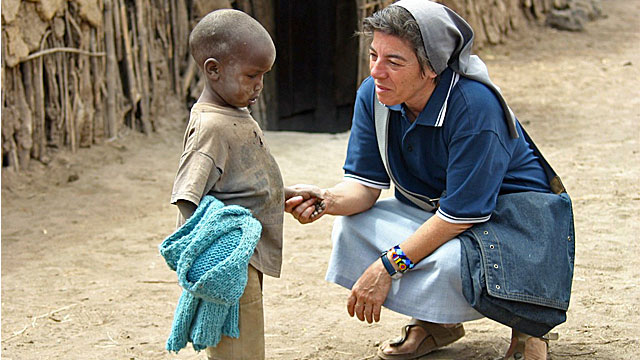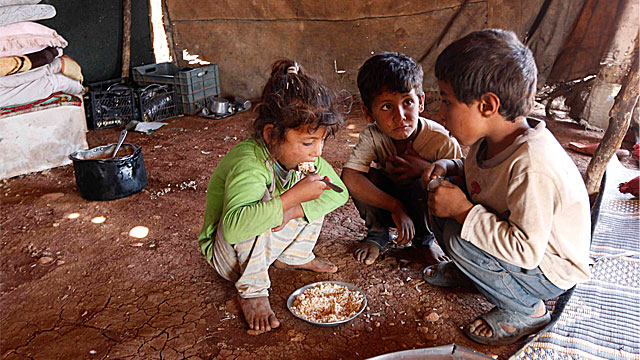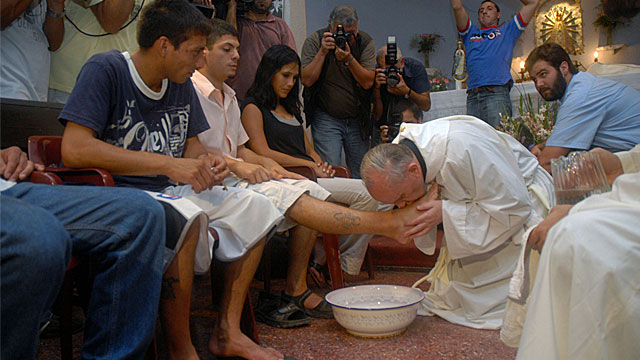

Practical Suggestions for Practicing the Corporal and Spiritual Works of Mercy
Salt + Light Media
Tuesday, December 8, 2015

By Joe Paprocki, DMin
Corporal Works of Mercy - The Corporal Works of Mercy are kind acts by which we help our neighbors with their everyday material and physical needs.
Feed the Hungry
 Clothe the Naked
Clothe the Naked
 Instructing
Instructing
 Bearing wrongs patiently
Bearing wrongs patiently
- see to the proper nutrition of your loved ones,
- support and volunteer for food pantries, soup kitchens, and agencies that feed the hungry
- make a few sandwiches to hand out as you walk through areas where you might encounter people in need
- educate yourself about world hunger
- avoid wasting food
- share your meals with others.
- help neighbors care for their homes and do repairs
- support and/or volunteer at a homeless shelter
- support and/or volunteer for charitable agencies who care for the homeless, build homes, and provide support in the wake of natural disasters
- advocate for public policies and legislation that provide housing for low-income people
- consider becoming a foster parent.
 Clothe the Naked
Clothe the Naked
- go through your drawers and closets and find good-condition clothes and shoes to donate to agencies that provide assistance for those in need
- participate in programs that provide towels and linens for hospitals in distressed areas
- Volunteer to work at a clothing drive or at a shelter where clothing is distributed to those in need
- Support the work of the St. Vincent de Paul Society
- spend quality time with those who are sick or homebound
- take the time to call, send a card or an e-mail to someone who is sick
- volunteer to drive patients to medical appointments and treatment facilities
- volunteer at a hospital
- assist those who are full-time caregivers for family members
- cook and delivers meals to the sick and homebound
- support and/or participate in ministries to those who are incarcerated
- support programs sponsored by agencies that advocate on behalf of those who are unjustly imprisoned
- support job-training and educational programs designed to rehabilitate prisoners
- pray for the families of inmates
- support programs that provide holiday gifts for prisoners and their families
- support efforts that seek the abolition of the death penalty
- take some small bills or loose change (or coupon books if you prefer not to carry cash) with you to hand out to people you encounter who are in need
- throw your coin change into a jar and periodically donate it to a charity
- if possible make a regular monetary donation to a charity that tends to the needs of the poor.
- be faithful about attending wakes/visitation
- support or volunteer at a hospice
- participate in a bereavement ministry
- spend time with widows and widowers
- take friends and relatives to visit the cemetery
- support ministries that offer free Christian burials to those unable to afford one
- offer daily prayers for those with terminal illnesses and for those who have died
- send Mass cards to families of those who have died.
 Instructing
Instructing
- commit yourself to learning about the Catholic faith and share your understanding of the faith with others and with those who welcome it
- share your insights, knowledge, and skills with others, especially friends, fellow students, coworkers
- take time to “tutor” those who are just beginning tasks
- read good literature and encourage others to do the same.
- be courageous yet compassionate in calling people and institutions to be faithful to Gospel values
- intervene in situations in which people are clearly doing harm to themselves or others
- respond to negative and prejudicial comments with positive statements
- put an end to gossip by walking away; set a good example for others.
- work at being optimistic and avoiding cynicism
- respond to cynicism, skepticism, and doubt with hope
- be articulate about your own hopes
- ask people about their hopes and support them in trying to attain them.
- walk with others through their pain
- offer words of encouragement to those who seem discouraged
- offer positive words to fellow students or coworkers who are having a difficult time with their tasks
- be present to those who are struggling or in emotional pain or despair
- offer sympathy to those who are grieving.
- pray for those who have wronged you and pray for the courage to forgive;
- ask forgiveness from others;
- let go of grudges; go out of your way to be positive with someone you are having a difficult time with.
 Bearing wrongs patiently
Bearing wrongs patiently
- work at being less critical of others
- overlook minor flaws and mistakes
- give people the benefit of the doubt
- assume that people who may have hurt you did so because they are enduring pain of their own
- pray for those who have wronged you.
Related Articles:
<<













